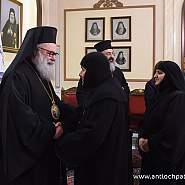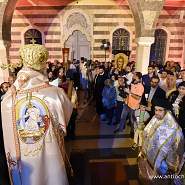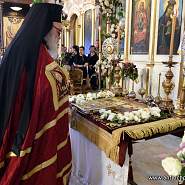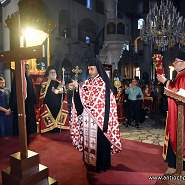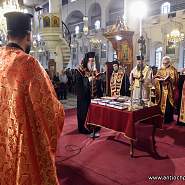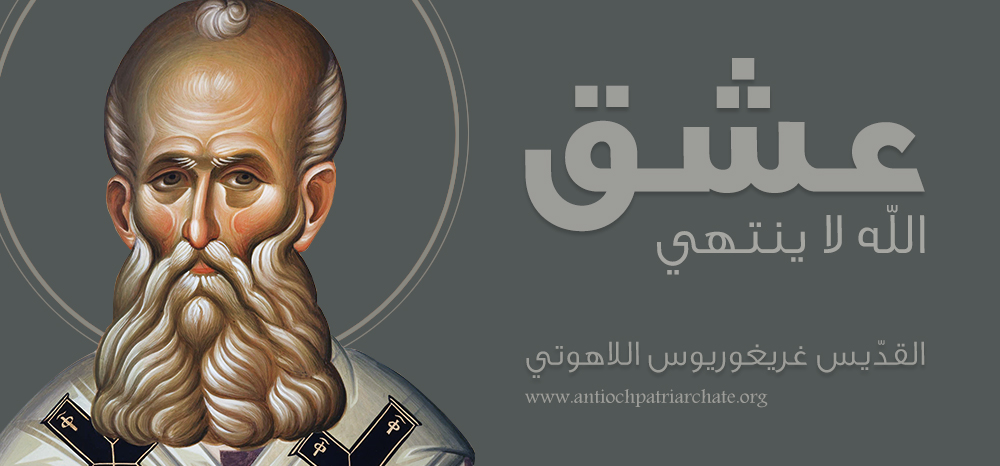
St Gregory the Theologian the Archbishop of…
Gregory the Theologian, Archbishop of Constantinople
Reading from the Synaxarion:
This great Father and Teacher of the Church was born in 329 in Arianzus, a village of the second district of Cappadocia, not far from Nazianzus. His father, who later became Bishop of Nazianzus, was named Gregory (commemorated Jan. 1), and his ![]() mother was named Nonna (Aug. 5); both are among the Saints, and so are his brother Caesarius (Mar. 9) and his sister Gorgona (Feb. 23). At first he studied in Caesarea of Palestine, then in Alexandria, and finally in Athens. As he was sailing from Alexandria to Athens, a violent sea storm put in peril not only his life but also his salvation, since he had not yet been baptized. With tears and fervour he besought God to spare him, vowing to dedicate his whole self to Him, and the tempest gave way to calm. At Athens Saint Gregory was later joined by Saint Basil the Great, whom he already knew; but now their acquaintanceship grew into a lifelong brotherly love. Another fellow student of theirs in Athens was the young Prince Julian, who later as Emperor was called the Apostate because he denied Christ and did all in his power to restore paganism. Even in Athens, before Julian had thrown off the mask of piety; Saint Gregory saw what an unsettled mind he had, and said, "What an evil the Roman State is nourishing" (Orat. V, 24, PG 35:693).
mother was named Nonna (Aug. 5); both are among the Saints, and so are his brother Caesarius (Mar. 9) and his sister Gorgona (Feb. 23). At first he studied in Caesarea of Palestine, then in Alexandria, and finally in Athens. As he was sailing from Alexandria to Athens, a violent sea storm put in peril not only his life but also his salvation, since he had not yet been baptized. With tears and fervour he besought God to spare him, vowing to dedicate his whole self to Him, and the tempest gave way to calm. At Athens Saint Gregory was later joined by Saint Basil the Great, whom he already knew; but now their acquaintanceship grew into a lifelong brotherly love. Another fellow student of theirs in Athens was the young Prince Julian, who later as Emperor was called the Apostate because he denied Christ and did all in his power to restore paganism. Even in Athens, before Julian had thrown off the mask of piety; Saint Gregory saw what an unsettled mind he had, and said, "What an evil the Roman State is nourishing" (Orat. V, 24, PG 35:693).
After their studies at Athens, Gregory became Basil's fellow ascetic, living the monastic life together with him for a time in the hermitages of Pontus. His father ordained him presbyter of the Church of Nazianzus, and Saint Basil consecrated him Bishop of Sasima (or Zansima), which was in the archdiocese of Caesarea. This consecration was a source of great sorrow to Gregory, and a cause of misunderstanding between him and Basil; but his love for Basil remained unchanged, as can be plainly seen from his Funeral Oration on Saint Basil (Orat. XLIII).
About the Year 379, Saint Gregory came to the assistance of the Church of Constantinople, which had already been trou bled for forty years by the Arians; by his supremely wise words and many labours he freed it from the corruption of heresy, and was elected Archbishop of that city by the Second Ecumenical Council, which assembled there in 381, and condemned Macedonius, Archbishop of Constantinople, the enemy of the Holy Spirit. When Saint Gregory came to Constantinople, the Arians had taken all the churches and he was forced to serve in a house chapel dedicated to Saint Anastasia the Martyr. From there he began to preach his famous five sermons on the Trinity, called the Triadica. When he left Constantinople two years later, the Arians did not have one church left to them in the city. Saint Meletius of Antioch (see Feb. 12), who was presiding over the Second Ecumenical Council, died in the course of it, and Saint Gregory was chosen in his stead; there he distinguished himself in his expositions of dogmatic theology.
Having governed the Church until 382, he delivered his farewell speech - the Syntacterion, in which he demonstrated the Divinity of the Son - before 150 bishops and the Emperor Theodosius the Great; in this speech he requested, and received from all, permission to retire from the see of Constantinople. He returned to Nazianzus, where he lived to the end of his life, and reposed in the Lord in 391, having lived some sixty-two years.
His extant writings, both prose and poems in every type of metre, demonstrate his lofty eloquence and his wondrous breadth of learning. In the beauty of his writings, he is considered to have surpassed the Greek writers of antiquity, and because of his God-inspired theological thought, he received the surname "Theologian." Although he is sometimes called Gregory of Nazianzus, this title belongs properly to his father; he himself is known by the Church only as Gregory the Theologian. He is especially called "Trinitarian Theologian," since in virtually every homily he refers to the Trinity and the one essence and nature of the Godhead. Hence, Alexius Anthorus dedicated the following verses to him:
Like an unwandering star beaming with splendour,
Thou bringest us by mystic teachings, O Father,
To the Trinity's sunlike illumination,
O mouth breathing with fire, Gregory most mighty.
Apolytikion of Gregory the Theologian in the First Tone
The pastoral flute of your theology conquered the trumpets of orators. For it called upon the depths of the Spirit and you were enriched with the beauty of words. Intercede to Christ our God, O Father Gregory, that our souls may be saved.
Kontakion of Gregory the Theologian in the Third Tone
O Glorious One, you dispelled the complexities of orators with the words of your theology. You have adorned the Church with the vesture of Orthodoxy woven from on high. Clothed in this, the Church now cries out to your children, with us, "Hail Father, the consummate theological mind."
The content on this page is under copyright and is used by permission. All rights reserved. These works may not be further reproduced, in print or on other websites or in any other form, without the prior written authorization of the copyright holder:
Reading (c) Holy Transfiguration Monastery - Brookline, MA
Apolytikion of Gregory the Theologian (c) Narthex Press
Kontakion of Gregory the Theologian (c) Narthex Press
The Synaxis of the New Martyrs of Russia
Reading from the Synaxarion:
On the Sunday that falls nearest to January 25, we commemorate all the faithful throughout the former Russian Empire who died at the hands of the atheists, beginning in the year 1917. Among them are the Royal Family (see July 4), followed by Patriarch Tikhon the Confessor (see Mar. 24), and an innumerable multitude of clergy, monastics, and layfolk who confessed the Name of Christ in the face of every conceivable mockery, torment, and bitter death.
Apolytikion of The Synaxis of the New Martyrs of Russia in the Third Tone
In these latter times, a host of Martyrs, * newly crowned with grace, rejoice in Heaven, * glorified with diverse forms of martyrdom; * for having censured the madness of godless foes, * they gained the laurels of triumph and victory. * Hence, they fervently entreat Christ for us unceasingly, * to grant great mercy unto us who sing their praise.
Kontakion of The Synaxis of the New Martyrs of Russia in the Plagal of the Fourth Tone
The choirs of Martyrs who contested in the ancient times * welcome the hosts of victors newly crowned by Christ our God, * and they form one common festival in divine joy. * For these ranks which fought for faith throughout the Russian land * set at nought the wicked schemes of godless tyranny. * Hence, we cry to them: * Rejoice, ye Passion-bearers of the Lord.
The content on this page is under copyright and is used by permission. All rights reserved. These works may not be further reproduced, in print or on other websites or in any other form, without the prior written authorization of the copyright holder:
Reading (c) Holy Transfiguration Monastery - Brookline, MA
Apolytikion of The Synaxis of the New Martyrs of Russia (c) Holy Transfiguration Monastery - Brookline, MA
Kontakion of The Synaxis of the New Martyrs of Russia (c) Holy Transfiguration Monastery - Brookline, MA
Prayer Before Reading Scripture
Shine within our hearts, loving Master, the pure light of Your divine knowledge and open the eyes of our minds that we may comprehend the message of Your Gospel. Instill in us also reverence for Your blessed commandments, so that having conquered all sinful desires, we may pursue a spiritual life, thinking and doing all those things that are pleasing to You. For You, Christ our God, are the light of our souls and bodies, and to You we give glory together with Your Father who is without beginning and Your all holy, good, and life giving Spirit, now and forever and to the ages of ages. Amen.
Epistle Reading
The Reading is from St. Paul's Letter to the Hebrews 7:26-28; 8:1-2
Brethren, it was fitting that we should have such a high priest, holy, blameless, unstained, separated from sinners, exalted above the heavens. He has no need, like those high priests, to offer sacrifices daily, first for his own sins and then for those of the people; he did this once for all when he offered up himself. Indeed, the law appoints men in their weakness as high priests, but the word of the oath, which came later than the law, appoints a Son who has been made perfect for ever. Now the point in what we are saying is this: we have such a high priest, one who is seated at the right hand of the throne of the Majesty in heaven, a minister in the sanctuary and the true tent which is set up not by man but by the Lord.
Gospel Reading
The Reading is from the Gospel According to John 10:9-16
The Lord said, "I am the door; if any one enters by me, he will be saved, and will go in and out and find pasture. The thief comes only to steal and kill and destroy; I came that they may have life, and have it abundantly. I am the good shepherd. The good shepherd lays down his life for the sheep. He who is a hireling and not a shepherd, whose own the sheep are not, sees the wolf coming and leaves the sheep and flees; and the wolf snatches them and scatters them. He flees because he is a hireling and cares nothing for the sheep. I am the good shepherd; I know my own and my own know me, as the Father knows me and I know the Father; and I lay down my life for the sheep. And I have other sheep, that are not of this fold; I must bring them also, and they will heed my voice. So there shall be one flock, one shepherd."




